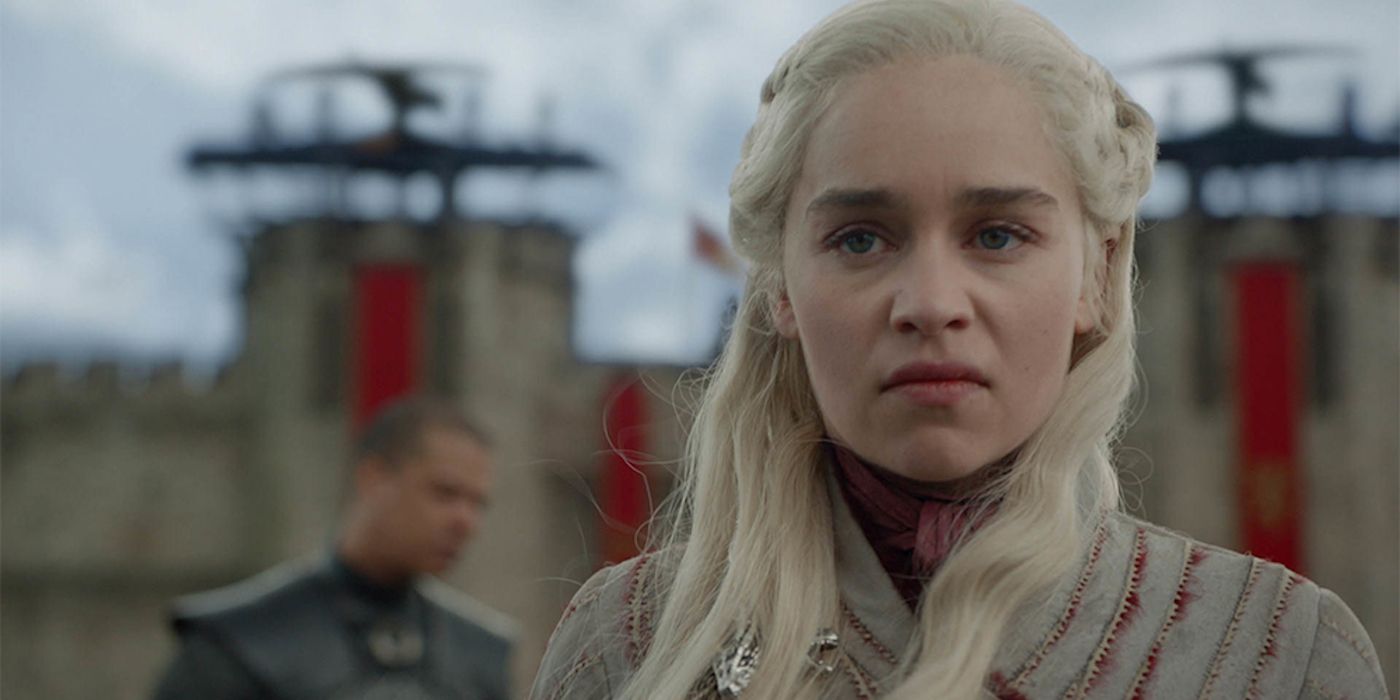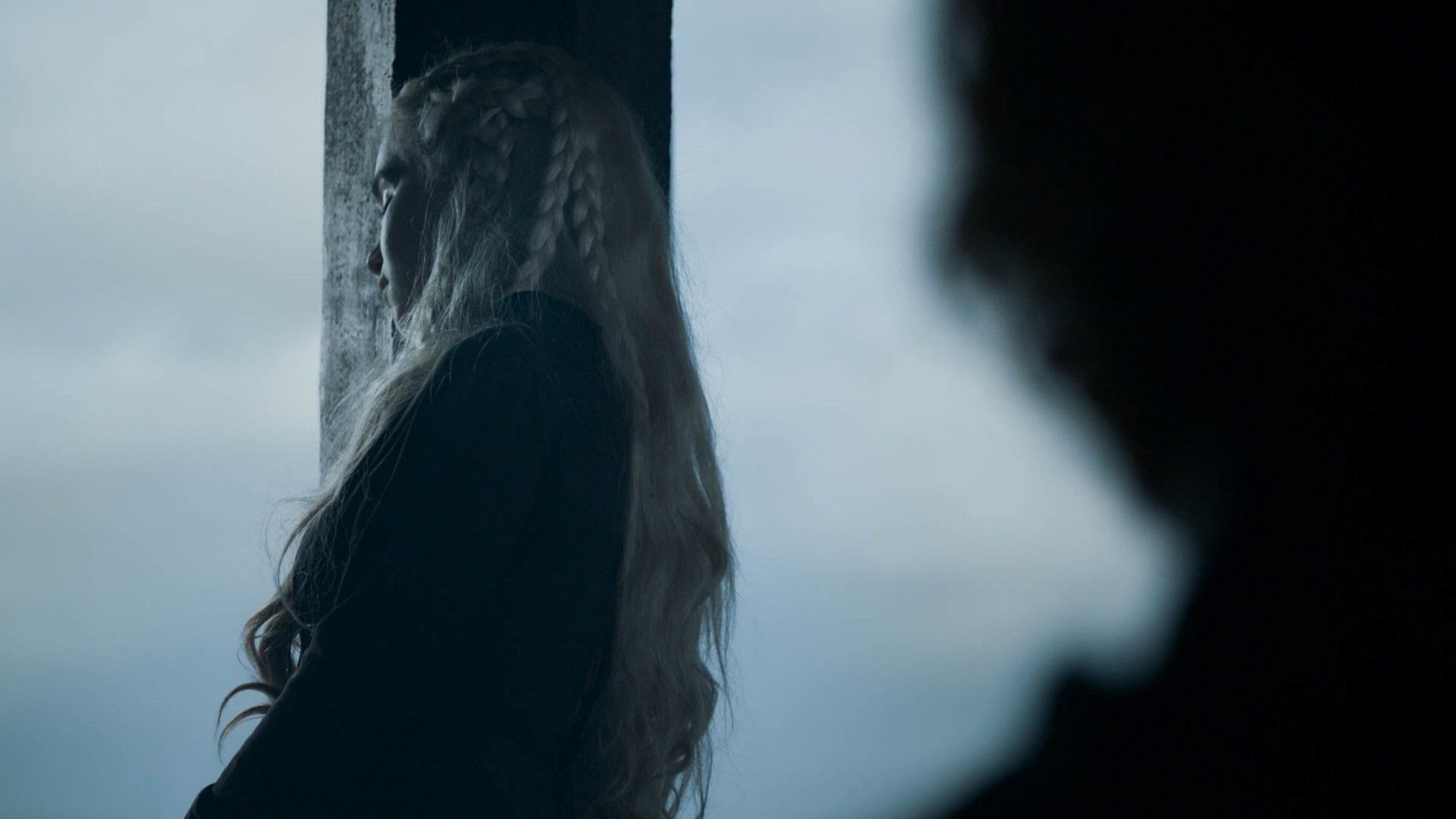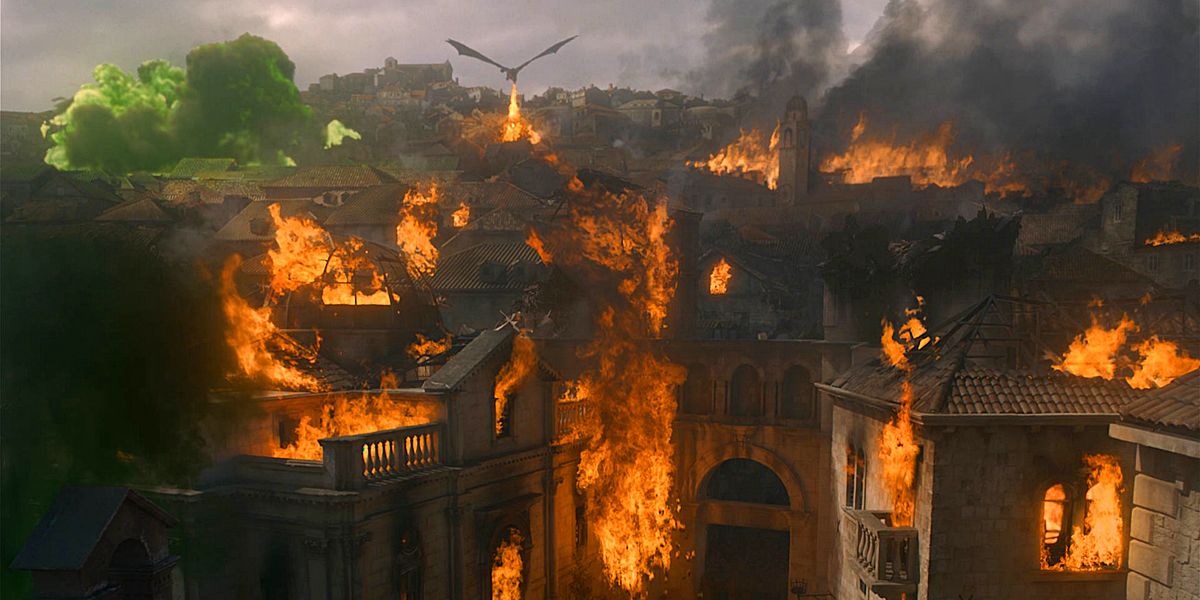WARNING: The following article contains major spoilers for Game of Thrones.
Millions watched in disbelief as the Mother of Dragons razed King's Landing in "The Bells," the penultimate episode of HBO's Game of Thrones. As the spires of the Red Keep fell, the drama's "true" villain was finally revealed in fire and blood.
Despite the uproar it caused, Daenerys Targaryen's heinous war crime was framed as the culmination of an eight-season arc that has taken her from self-proclaimed savior to the very thing she swore she'd never become. Her "Mad Queen" fate has indeed been seeded throughout the show since the Season 1 finale, in which a Dothraki mystic predicted her offspring would take after their grandfather, Mad King Aerys, and burn cities to the ground. This was also the first instance of Dany saying "not today" to destiny; promising the Dothraki that -- like the witch -- those who would do them harm would "die screaming."
From Bran's vision in Season 4 of a dragon flying over King's Landing to Kinvara's promise in Season 6 that "dragons will purify nonbelievers by the thousands," no one can say the calls weren't coming from inside of the house. And yet, when Dany snapped harder than a Gauntlet-wielding Thanos, the move was viewed by many as a plot twist rather than a satisfying payoff. Either it came as too big a surprise for those who’d missed all the signposting, or else it didn’t feel at all earned for those who had seen it coming but expected a more gradual slide than a sudden crime of passion.
What went wrong, then? The simplest explanation is this: Foreshadowing isn't a substitute for character development.
The problem is, in a show that loves pantomime figures of hate (Joffrey, Cersei, Euron, Ramsay, etc.) Dany’s moves toward "madness" -- punishing those who stood in the way of her broadly altruistic aims -- have been more in step with those of a classic antihero than the origin story of a villain. Her brand of fiery justice is reminiscent of the ultra-violent methods of vigilantes like Batman or The Punisher. Similarly, Dany has always kept her controversial methods in check by following her own moral code.
She's often overstepped the line, acted selfishly and laid her imperialistic streak bare, slotting easily into an antiheroic pantheon filled with egomaniacs, psychopaths, abusers and soldiers of vengeance. Like them, Dany's saving grace has always been the fierceness with which she protects those under her wing.
Even on the eve of her battle against Cersei Lannister, beset by loneliness and paranoia, the Breaker of Chains reaffirmed her commitment to thwarting tyranny for the good of the many, no matter the cost. That's why Dany veering wildly away from her staunch principles into blind nihilism felt like the creators trading off character complexity for cheap shock tactics.
Antiheroes have the capacity to ride a sliding scale between heroism and villainy, that’s what makes them interesting. They are at their least interesting when they deal in moral absolutes, as the showrunners had Dany do by going full-on genocidal maniac, post-victory. It also has the knock-on effect of making her boyfriend-nephew's decision-making less interesting in the aftermath. If the siege of King's Landing had been dictated by character development rather than foreshadowing, Dany instead might have been forced to regretfully sacrifice the lives of some -- some! -- civilians in order to dethrone the show’s longest-surviving villain; muddying her record without destroying it.
That would then have given Jon Snow -- the ideal hero to Dany's unscrupulous one -- a real moral quandary. As it stands, he's instead reduced down to a fairy tale prince ousting a wicked queen from a tower. Adding insult to injury, we were offered no view of Dany’s face while she was reigning hellfire from above. What was her emotional state then? Joy? Anger? Sadness? Who cares! She's evil and unfeeling now.
In contrast, we can look at Arya Stark and see foreshadowing and development working in perfect harmony; taking the character organically from lost little princess to deadly assassin to the true hero of "The Long Night."
Dany has always stood dangerously close to the edge of a moral cliff. Steering her off of it in such an abruptly forced fashion not only gives us the least interesting version of her character but also robs us of something television is crying out for. As Jason Bailey highlighted in his piece for Flavorwire, "Why Are There So Few Female Anti-Heroes On Film?," there’s a dearth of antiheroic female characters in starring roles on television, made all the more startling in a period when male antiheroes are very much in vogue: from Tony Soprano and Dexter Morgan to Walter White and Rick Sanchez. These characters are afforded a huge amount of freedom in what they can get away with before we’re willing to label them outright villains.
Dany's antiheroic foundations are clearly obscured by her gender and sexuality. When we think about female antiheroes, there's really only one well-established archetype to use as a model: the femme fatale. While Dany has had plenty of romantic interests, she's not the darkly seductive woman that the trope describes. And because femme fatales exist as temptresses to male heroes and villains, they always occupy supportive rather than the leading roles.
It's easier for viewers to accept the vengeful antiheroism of Arya because she's effectively been given a male heroes' journey (and we don't just mean her early gender-bending exploits). Dany's independent role as the "fire" to Jon's "ice," and her refusal to weaponize her sexuality in the way other ambitious women in Westeros have doesn't make her a comfortable fit for everything we know about female antiheroes.
Instead, fans have long tried to figure out if she's purely heroic (a feminist icon to name your daughter after) or purely villainous (an echo of the West's colonial past.) Like men, fictional women don't have to be empowering to be powerful. They don't have to be aspirational, or even likable, to be compelling. A broader spectrum of female anti-heroes broadens the scope of how women can be represented.
"If you think this has a happy ending, you haven't been paying attention," Ramsay Bolton winked to us in Season 3, and sure -- Dany giving into her demons is a tragic end to her story. But, the execution has made it an empty, dull tragedy; clumsily coating the character pitch black when a deeper shade of grey would have preserved her nuance, and set up a less predictable finale.
It might be the ending the creators feel Dany needs, but it certainly isn't the one she deserves.
Concluding Sunday at 9 p.m. ET on HBO, Game of Thrones stars Peter Dinklage as Tyrion Lannister, Nikolaj Coster-Waldau as Jaime Lannister, Lena Headey as Cersei Lannister, Emilia Clarke as Daenerys Targaryen, Sophie Turner as Sansa Stark, Maisie Williams as Arya Stark and Kit Harington as Jon Snow.



